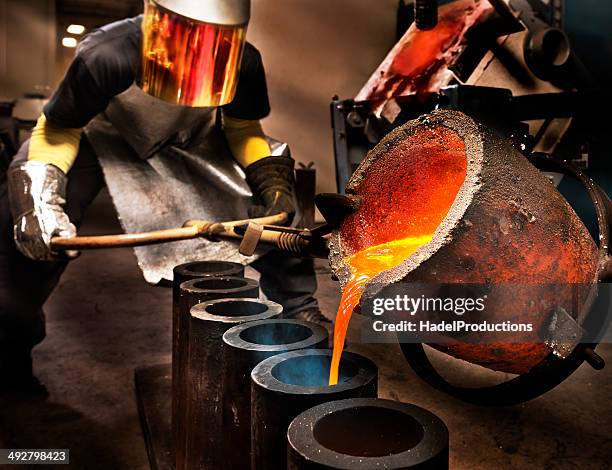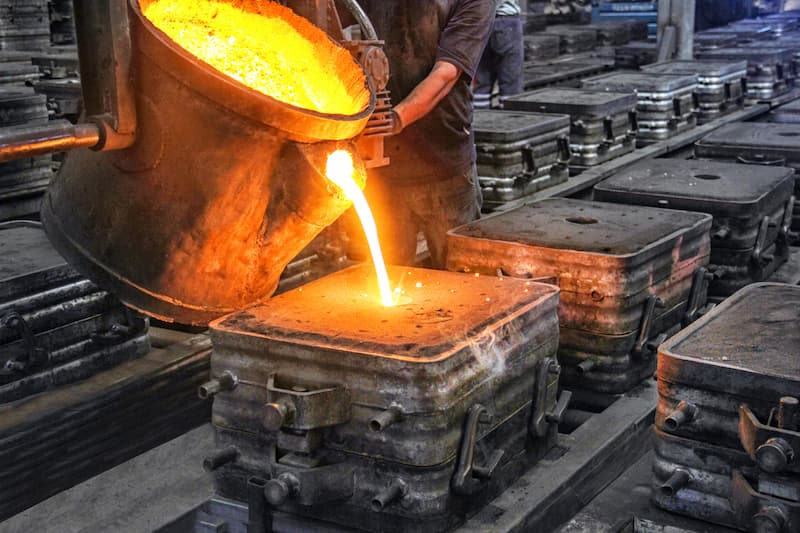Creative Lessons from the Artistic Side of Metal Casting
Wiki Article
A Comprehensive Guide to Metal Casting: Benefits and Solutions Offered by Foundries
Metal casting is a critical process in numerous markets, offering many advantages with the solutions of foundries. These centers transform molten metal right into precise and long lasting parts, dealing with details client demands. By employing sophisticated technologies, factories assure quality and effectiveness in manufacturing. The complexities of metal casting and the varied strategies entailed raise essential concerns regarding its duty in modern manufacturing. What advancements exist ahead in this essential field?Comprehending the Metal Casting Process
The metal casting process is a fundamental technique utilized in making to develop intricate forms and parts. This approach entails putting molten metal into a mold designed to form the preferred item. The process begins with pattern production, which functions as a theme for the mold and mildew. Aluminum Foundry. Different materials, such as sand, metal, or ceramic, are used for mold-making, depending upon the certain requirements of the casting
As soon as the mold and mildew is ready, molten metal is poured right into it and enabled to strengthen and cool. After solidification, the mold and mildew is eliminated, exposing the cast component. Numerous methods, consisting of sand casting, financial investment casting, and die casting, are used, each fit to different applications and products. Quality control measures, such as examinations and screening, are vital to guarantee the last product fulfills specs. In general, the metal casting procedure plays a vital function in generating components for markets varying from auto to aerospace.
Secret Benefits of Metal Casting
Metal casting offers substantial benefits that make it a recommended manufacturing approach in numerous markets. Its design versatility and accuracy permit intricate shapes, while cost-effective automation enhances efficiency. Furthermore, the flexibility and toughness of materials utilized in casting add to the toughness of the last items.Design Versatility and Accuracy
Releasing amazing style flexibility and precision, metal casting enables designers and designers to produce detailed shapes and features that would be impossible or challenging to attain with various other manufacturing techniques. This ability makes it possible for the manufacturing of complex geometries, internal structures, and great details that improve item capability and aesthetic appeals. Furthermore, numerous casting strategies, such as sand casting, investment casting, and die casting, offer additional choices for customization, accommodating diverse material properties and project requirements. The adaptability of molds permits modifications during the style phase, improving the shift from idea to end product. Ultimately, metal casting attracts attention for its capacity to supply high-precision parts, making it an important process in sectors varying from vehicle to aerospace and past.Economical Automation
Affordable automation stands as one of the key benefits of metal casting, making it possible for suppliers to generate big quantities of parts at a reduced cost each. This performance develops from the ability to develop complex molds that can be recycled several times, significantly reducing arrangement and operational costs. In addition, metal casting processes, such as sand casting and pass away casting, permit high throughput, making it possible to fulfill the demands of large-scale manufacturing runs. The decreased product waste and power usage further improve cost financial savings, making metal casting an appealing option for markets needing bulk parts. Generally, the cost-effective nature of metal casting settings it as a preferred approach for producers aiming for financial efficiency in their manufacturing processes.Product Flexibility and Strength
Among the standout characteristics of metal casting is its impressive material convenience, which enables for the use of a large range of steels and alloys. This versatility makes it possible for producers to choose products that best fit their certain applications, from aluminum and bronze to iron and steel. Each metal provides special buildings, including varying degrees of stamina, deterioration resistance, and thermal conductivity. Consequently, metal casting can generate components that satisfy rigorous performance demands throughout diverse markets, such as automotive, aerospace, and building and construction. In addition, the strength of cast metals can be enhanced through various treatment processes, guaranteeing longevity and long life. Aluminum Foundry. On the whole, the mix of product convenience and integral toughness makes metal casting a recommended selection for generating top notch elementsKinds of Metal Casting Methods
Metal casting includes a range of methods that cater to different manufacturing needs and material homes. Typical approaches consist of sand casting, which makes use of a sand mold for complex shapes, and investment casting, understood for its accuracy and surface finish. Pass away casting is an additional technique that employs high-pressure injection of molten metal right into mold and mildews, suitable for mass manufacturing of small parts.Shell molding provides a quicker alternate, utilizing a resin-coated sand to develop thin-walled mold and view mildews, while lost foam casting permits detailed styles without the requirement for a core.
Furthermore, continuous casting is utilized for producing long areas of metal, such as bars or sheets, by solidifying liquified metal in a continuous procedure. Each method is and offers one-of-a-kind advantages selected based upon elements like the required information, production quantity, and material kind, guaranteeing exceptional outcomes in metal manufacture across numerous markets.
The Role of Foundries in Metal Casting
Factories play a critical duty in the metal casting process, acting as the centers where molten metal is changed into completed items. These specialized establishments are outfitted with the required devices and modern technologies to deal with different metals, making sure top quality outcomes. Shops are in charge of several vital features, including thawing the metal, putting it into mold and mildews, and allowing it to strengthen.In addition, they maintain stringent safety and security and environmental requirements to shield workers and reduce eco-friendly impact. Competent technicians and engineers work together to enhance casting procedures, improving performance and reducing waste. Foundries also take part in high quality control procedures, making certain that the last products meet specific tolerances and specs. This quality control is crucial for industries that count on exact parts, such as automotive and aerospace. Consequently, factories add considerably to the overall manufacturing landscape, making it possible for technology and development throughout numerous sectors.
Custom Metal Casting Services
Personalized metal casting solutions use tailored design solutions that meet specific customer demands. These services additionally give product selection knowledge, guaranteeing the right metal is picked for the preferred application. Such flexibility and expertise boost the general high quality and performance of the last item.
Customized Style Solutions
Tailored layout services in metal casting offer manufacturers with the versatility to develop elements that satisfy specific performance and visual requirements. Factories offer personalized solutions that allow clients to specify dimensions, forms, and surface area finishes to accomplish preferred outcomes. This personalization procedure often includes partnership between engineers and developers, making certain that the end products align with operational requirements and market requirements. Advanced innovations, such as computer-aided style (CAD) and simulation software program, make it possible for specific modeling and screening of parts prior to manufacturing, improving and reducing errors efficiency. By leveraging tailored layout remedies, organizations can maximize performance while minimizing waste and expenses, ultimately leading to an extra affordable side in the marketplace. This adaptability is important for industries requiring distinct applications and specs.Product Choice Knowledge
When selecting products for metal casting, know-how plays a necessary function in guaranteeing that the right selection lines up with both performance needs and cost-effectiveness. Foundries use skilled specialists that comprehend the buildings of different metals and alloys, permitting them to recommend ideal materials for specific applications. Aspects such as strength, deterioration resistance, and thermal conductivity are thoroughly taken into consideration to satisfy the customer's needs. In addition, industry fads and developments in product science notify these choices, enabling shops to stay competitive. By leveraging their expertise, factories can aid clients in steering via complex material alternatives, ultimately resulting in improved item quality and minimized manufacturing costs. This specific expertise is important for accomplishing effective outcomes in custom-made metal casting solutions.Quality Assurance in Metal Casting
Quality control in metal casting is crucial to ensure that the last items fulfill the required specs and efficiency criteria. Foundries employ a range of techniques and techniques to assure the finest quality of actors parts. This procedure starts with rigorous material inspections, confirming that raw materials adhere to sector criteria. Throughout the casting procedure, real-time surveillance and testing are carried out to analyze parameters such as temperature, mold stability, and dimensional precision.
Applications of Metal Castings Across Industries
Metal castings play a crucial function in various industries, working as the foundation for numerous applications. In the auto industry, cast elements such as engine blocks and transmission real estates are needed for car performance and dependability. The aerospace sector counts on precision castings for important parts that assure safety and efficiency in flight. Additionally, the building market utilizes metal spreadings for components, installations, and architectural aspects, improving the longevity of structures and framework.The energy sector benefits from castings used in wind turbine blades and various other tools essential for power generation. The clinical area additionally uses metal castings in tools and gadgets, demonstrating the flexibility of this manufacturing process. On the whole, metal spreadings are important to the performance and development of diverse fields, showcasing their relevance in contemporary technology and infrastructure development
Frequently Asked Concerns
What Products Are Typically Used in Metal Casting?
Usual materials used in metal casting consist of aluminum, iron, steel, brass, and bronze. Each product uses distinct residential or commercial properties suitable for different applications, allowing suppliers to select the very best alternative based on strength, rust, and weight resistance.The length of time Does the Metal Casting Process Commonly Take?
The metal casting process commonly takes several hours to a couple of days, depending on aspects such as the intricacy of the style, sort of metal utilized, and the details casting technique employed by the factory.
What Is the Ecological Impact of Metal Casting?
The ecological influence of metal casting includes energy intake, exhausts, and waste generation. Foundries commonly implement procedures to minimize these impacts, such as reusing products and utilizing cleaner innovations to reduce their ecological footprint.Can Metal Casting Be Provided For Small-Scale Projects?
Metal casting can without a doubt be performed for small-scale jobs. Numerous shops satisfy such needs, offering personalized services that fit minimal manufacturing runs while maintaining quality and precision in the final items.What Are the Safety Procedures in Metal Casting Foundries?
In metal casting foundries, precaution consist of personal protective tools, correct ventilation, training on tools usage, emergency treatments, normal maintenance checks, and adherence to market safety and security standards to minimize risks related to liquified metal and unsafe products.Additionally, metal casting processes, such as sand casting and die casting, allow for high throughput, making it feasible to meet the needs of large-scale production runs. One of the standout characteristics of metal casting is its amazing material adaptability, which permits for the usage of a vast array of steels and alloys. In addition, continual casting is used for creating lengthy sections of metal, such as sheets or bars, by strengthening liquified metal in a constant process. Foundries play a pivotal role in the metal casting process, serving as the facilities where molten metal is changed right into completed products. Common materials made use of in metal casting consist of click reference light weight aluminum, iron, bronze, steel, and brass.
Report this wiki page